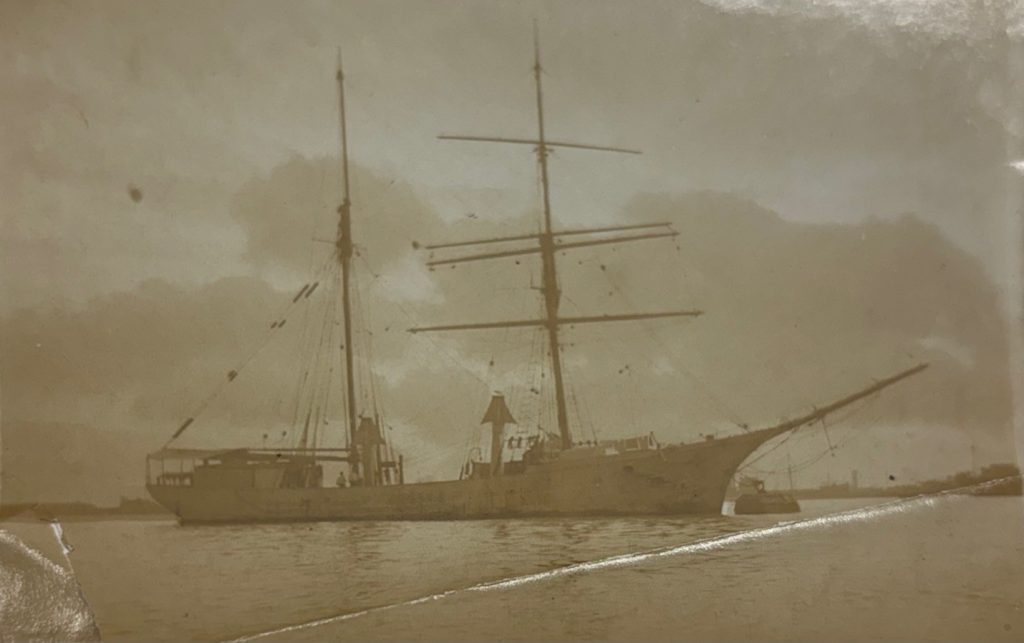Top-secret operations of Surrey hero remembered at Portsmouth Historic Dockyard
Wednesday 30th July marked 107 years since Harold Auten, from Leatherhead Surrey, committed a stunning act of bravery that earnt him a Victoria Cross; his bravery however would be a well-kept secret until the First World War was over. The joint-highest decoration in Britain’s Armed Forces, VCs are awarded for unparalleled acts of bravery.
Harold Auten spent most of his time in the War in the murky world of Q-Ships, secretly combatting the fearsome submarines of the German Imperial Navy. During the War, Germany had set their sights on the merchant ships that supplied Britain with food and other necessities. Q-ships were the Royal Navy’s solution. At this time, it was difficult for ships to sink submarines when they were underwater, so they had to find a way to force them to surface.
The solution was to fit old merchant ships with camouflaged weapons and crew them with Royal Navy personnel. German submarines would usually sink merchant ships by surfacing and using their deck guns, as torpedoes were expensive and limited, and these ships were easy targets. Q-ships would bait a submarine into surfacing before opening fire, hoping to catch it unaware.
Naturally, working on Q-ships was exceptionally dangerous; the ships were not well-armed or well-armoured, so failed operations were common. Auten commanded various Q-ships during the war and helped develop strategies to make them more effective. The name for these ships came from their base in Queenstown (now Cobh), Ireland. To ensure the Q-ships were effective, the nature of the operations had to be top-secret even to the rank and file of the Royal Navy.
Auten was the deciding factor in a significant Q-ship action during the War which ultimately earned him a VC (Victoria Cross). His ship HMS Stock Force was torpedoed by a German submarine. Despite it sinking, he commanded his crew to hold fire, waiting for the perfect moment to strike. When his ship opened fire, Auten immobilised the submarine in three shots, making her a sitting duck for the crew to finish her off. The crew then fought to keep HMS Stock Force afloat for over four hours until they were rescued by the Royal Navy.

An example of a First World War-era Q-ship Credit NMRN
Following the War, Auten moved to the United States of America, and worked as an executive in the film industry but remained in the Royal Naval Reserves. In 1928, Auten was the naval advisor on the film ‘Q-Ships’ and he, alongside five of his crew from HMS Stock Force, played themselves in the film. In the Second World War, Auten helped organise trans-Atlantic convoys, again protecting Allied shipping from German U-boats. For this he was awarded medals by the United States and the Netherlands.
Usually, VCs and the circumstances around them were announced to the public but due to the secrecy of Auten’s operations there was no mention of his daring actions that day. Today, however, his collection of medals, including his VC and those won during the Second World War, are on permanent display in the HMS Gallery at Portsmouth Historic Dockyard, celebrating tales of bravery and camaraderie in the Royal Navy. The wall features the stories of three separate Victoria Crosses, a sled used by the team who found Scott of the Antarctic, and more.
Portsmouth Historic Dockyard is home to one of the largest collections of historic ships and maritime artefacts in the world. Follow in the footsteps of Vice-Admiral Lord Horatio Nelson onboard HMS Victory, climb aboard the pride of Queen Victoria’s fleet HMS Warrior, and discover the fate of Henry VIII’s favourite ship the Mary Rose.
Portsmouth Historic Dockyard is an hour drive from Surrey, or around two hours on the train, with its own car park and train station mere minutes away. This summer, visitors can also unlock big savings with a time-limited price drop on Ultimate Explorer tickets, offering 12 months of access to a world of maritime history. To purchase a ticket to the museum please visit: bit.ly/40I4Sz6.
Top: Harold Auten’s medals on display at Portsmouth Historic Dockyard